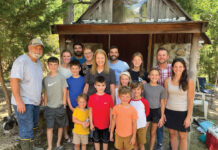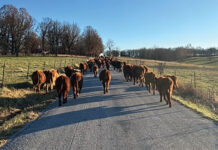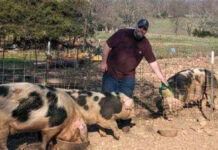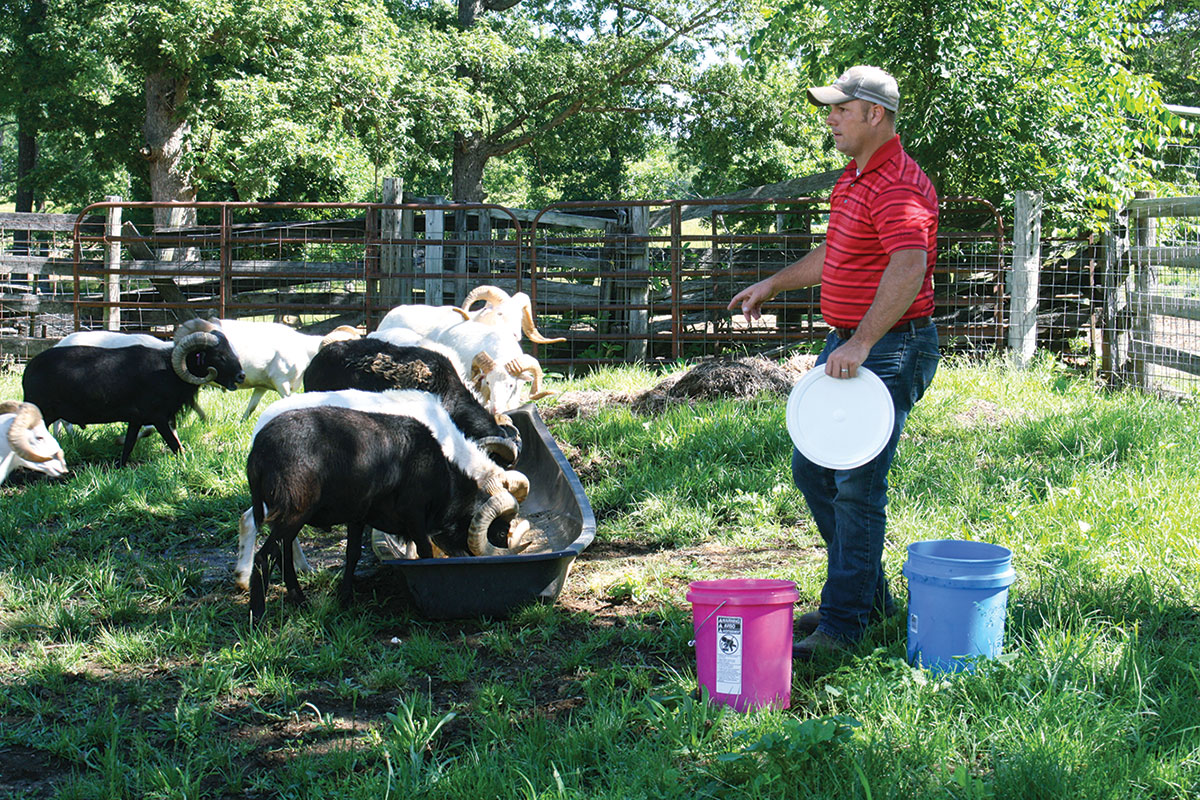
Diversification was a lesson that Brad McCall’s grandmother, Marie Murrell, preached often and one that he and his partner, Everett Clamp, have taken to heart at Steins Creek Farm in southern Laclede County, just north of Grovespring, Mo. On 1,100 acres, they raise 15 head of registered Herefords, as well as 250 head of commercial cattle, 40 head of registered Dorper sheep and 15 registered Boer goats. Their operation is made up of two neighboring family farms, belonging to Brad’s paternal and maternal grandparents. They have combined the two farms into one agricultural enterprise named for the small creek that runs through the land.
“We actually started raising Boer goats when the nieces, Leslie and Lindsey, needed an FFA project several years ago. We went to Springfield to the Missouri Meat Goat Association sale and bought three does. They began showing them at local county fairs where they won multiple competitions. We contacted Josh Stephans of Buffalo, Mo., who has shown and worked with Boer goats his entire life. He shows our goats for us and has been a real mentor and guide in everything to do with Boer goats,” Everett explained. “In Missouri, we are thousands of pounds short of the demand for goat meat here each year. In other words, demand is high and that keeps prices high, too. Our registered sales are done by Leon Caselman of the Buffalo Livestock Auction for the Missouri Meat Goat Association, which is a great resource for local producers.”
While the operation is diversified, the men see a great demand for high-quality goats.
“The goat market is just amazing,” Everett said. “Young goats actually bring more than calves right now. You have to remember that goats can kid twice a year, whereas cows only calve once a year. A 6-to-12-month-old weaned goat will bring anywhere from $500 to $1,200. The registered show goats can go as high as $1,500 to $2,700, right on up to $10,000 or more. When they are weaned at 2 months and around 60 pounds in a commercial herd, they are ready for sale. Meanwhile, for those that are butchered, a 105 pound goat produces approximately 80 pounds of meat.”
Goats also require less pasture than cattle.
“The goats are ideal for those with smaller acreages, so there are a number of older people now getting into them,” Brad added. “My aunt has 30 goats on 10 acres and is doing really well with them.”
Everett continued. “I can’t tell parents enough, these goats are the greatest project for kids at a relatively low cost. They provide an excellent educational resource and teach responsibility. This past year in October, we did the first statewide 4-H goat and sheep show at the Kenneth E. Cowan Civic Center in Lebanon, Mo., sponsored by the Mid-Missouri Responsible Breeders. We also did a workshop for 4-H leaders and now FFA wants us to do one this next year.”
The farms were established by Brad’s grandparents, Darris and Fern McCall and Leslie and Marie Murrell, then continued by his parents, Bill and Ann McCall.
Brad, Everett, Brad’s parents and grandparents milked 130 Holsteins until 12 years ago when they converted the dairy farm to a beef cattle operation. Brad explained that there have been homesteads on their property since before the Civil War and while they have kept the lands within the families, they also preserved a couple of the original historical residences.
They have incorporated two separate log cabins, one built in 1835 by Elijah Bohannon and the other built by Brad’s great-great-great grandfather Henry Lewis in 1841 into their sprawling exquisitely decorated home. While the original logs, carefully numbered during the de-construction and moving process to assure their proper re-assembly, are visible inside the home, on the outside they are covered by the same siding as the rest of the house. This not only assures the consistency of the home’s exterior, it further preserves the original nearly 200-year-old logs.
Everett also serves as the executive director of the Missouri Pet Breeders Association (MPBA), an agricultural investigative and advocacy organization for proposed legislation, with offices in Lebanon.
“We have really enjoyed all of the animals but especially the raising of the goats. The 9-year-old nephew, Will, participated in his first show this past year and he won every competition he entered. Leslie and Lindsey are now in college, one studying to be an ag teacher and the other studying ag business. We are hopeful that at least one of the three will want to keep the farm going. They are, after all, the next generation of this family’s farming legacy.”







